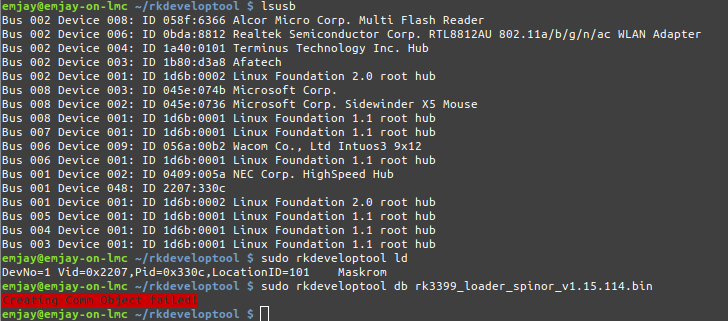Here’s the error after flash at boot time by shortcut the SPI1_CLK to GND:
emjay@emjay-on-lmc ~/rkdeveloptool $ lsusb
Bus 002 Device 008: ID 058f:6366 Alcor Micro Corp. Multi Flash Reader
Bus 002 Device 006: ID 0bda:8812 Realtek Semiconductor Corp. RTL8812AU 802.11a/b/g/n/ac WLAN Adapter
Bus 002 Device 004: ID 1a40:0101 Terminus Technology Inc. Hub
Bus 002 Device 003: ID 1b80:d3a8 Afatech
Bus 002 Device 001: ID 1d6b:0002 Linux Foundation 2.0 root hub
Bus 008 Device 003: ID 045e:074b Microsoft Corp.
Bus 008 Device 002: ID 045e:0736 Microsoft Corp. Sidewinder X5 Mouse
Bus 008 Device 001: ID 1d6b:0001 Linux Foundation 1.1 root hub
Bus 007 Device 001: ID 1d6b:0001 Linux Foundation 1.1 root hub
Bus 006 Device 002: ID 056a:00b2 Wacom Co., Ltd Intuos3 9x12
Bus 006 Device 001: ID 1d6b:0001 Linux Foundation 1.1 root hub
Bus 001 Device 077: ID 2207:330c
Bus 001 Device 002: ID 0409:005a NEC Corp. HighSpeed Hub
Bus 001 Device 001: ID 1d6b:0002 Linux Foundation 2.0 root hub
Bus 005 Device 001: ID 1d6b:0001 Linux Foundation 1.1 root hub
Bus 004 Device 001: ID 1d6b:0001 Linux Foundation 1.1 root hub
Bus 003 Device 001: ID 1d6b:0001 Linux Foundation 1.1 root hub
emjay@emjay-on-lmc ~/rkdeveloptool $ rkdeveloptool ld
DevNo=1 Vid=0x2207,Pid=0x330c,LocationID=104 Maskrom
emjay@emjay-on-lmc ~/rkdeveloptool $ rkdeveloptool db rk3399_loader_spinor_v1.15.114.bin
Creating Comm Object failed!



